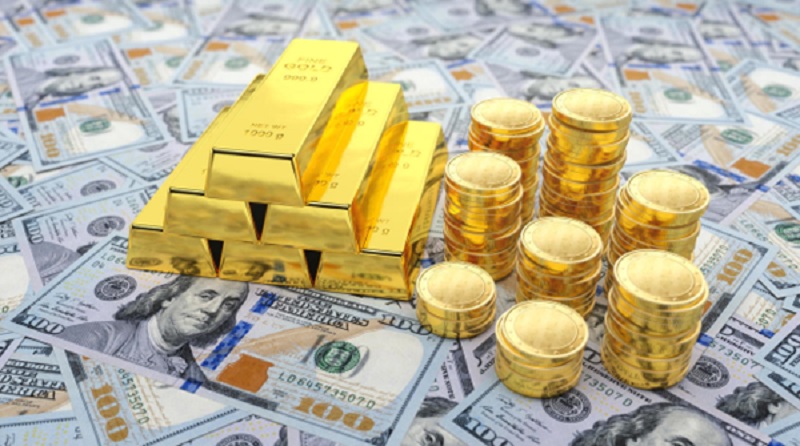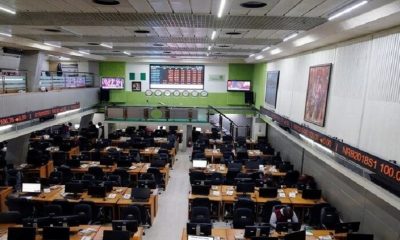Economy
Is Gold An Inflation Hedge?

Many investors consider gold as a safe-haven asset, particularly during times of economic uncertainty. It has been valued for centuries due to its beauty and scarcity. However, one question that often arises is whether gold can act as an effective hedge against inflation. In this article, we will examine the relationship between gold and inflation and explore the reasons why many investors turn to the precious metal in times of rising prices.
Before delving into the topic, it is essential to understand what exactly inflation is. Inflation refers to the persistent increase in the general price level of goods and services in an economy over a certain period. When this occurs, each unit of currency loses purchasing power over time.
Why Investors Turn To Gold During Inflationary Times?
When significant inflation looms on the horizon, individuals tend to worry about their investments losing value.
This fear prompts investors to seek out assets that have historically acted as hedges against rising prices. While younger investors choose to invest in gold stocks, people who prepare for retirement usually choose from the best gold IRA accounts to safeguard their hard-earned funds. Below are the most popular reasons why people choose to invest in gold in the first place.
Historical Track Record
Gold has a long history of being used as a store of value throughout human civilization. Its scarcity and durability make it an appealing investment option during times when traditional currencies lose value due to inflation.
Limited Supply
Unlike fiat currencies controlled by central banks that can be printed at will, new sources of gold are relatively rare and costly to extract from the ground. This limited supply ensures that gold maintains its intrinsic value over time.
Universally Accepted Store Of Value
Gold has been widely accepted as a form of currency across cultures for centuries. Even today, central banks around the world hold significant quantities of gold in their reserves as a safeguard against financial instability or economic crises.
Tangible Asset Class
One crucial aspect that sets gold apart from other investments is its tangibility – you can actually touch it! Unlike stocks or bonds that exist only on paper or in digital form, gold can be held, admired, and worn. This physical presence can provide a sense of security during uncertain times.
What is The Relationship Between Gold And Inflation?
While gold has many qualities that make it an attractive investment during inflationary periods, the relationship between the two is not as straightforward as some might believe.
Historical Analysis
Looking back at past data provides us with evidence of gold’s potential as an inflation hedge. Historical analysis shows that gold prices have often increased during periods of high inflation or economic uncertainty. For example, during the Great Recession of 2008-2009 and more recently during the COVID-19 pandemic, gold prices soared.
Supply And Demand Factors
Demand for gold tends to rise when there are concerns about currency devaluation or rising prices. As investors seek out safe-haven assets, increased demand leads to higher prices. Economic uncertainty and inflationary pressures amplify this effect.
Investor Sentiment
Another factor that influences the relationship between gold and inflation is investor sentiment. When individuals anticipate inflationary conditions, they may rush to buy gold as a hedge against their fears, which subsequently drives up its price further.
Correlation vs Causation
Despite these correlations between gold and inflation, it is essential to acknowledge that one does not necessarily cause the other. Correlations show how two variables move together but do not always demonstrate cause-and-effect relationships. The increase in gold prices during times of rising inflation could also be attributed to other factors such as shifts in investment preferences or changes in international geopolitical dynamics.
Different Ways to Invest in Gold
Now that we understand why investing in gold holds such allure let’s explore some popular methods:
Physical Gold: Holding Tangible Wealth
One classic way of investing in gold is through physical ownership. This includes purchasing bullion bars or coins directly from reputable dealers. By holding tangible assets like these shiny golden coins right at your fingertips, you become an owner of wealth that can be easily accessed or sold when necessary.
However, storing physical gold does require consideration regarding security and insurance measures. For those who prefer a hands-off approach when it comes to storage, reputable companies like Goldco offer secure vaulting services along with flexible options for acquiring precious metals.
Exchange-Traded Funds (ETFs): Golden Access without the Weight
If you’re seeking a more convenient and flexible approach to gold investment, exchange-traded funds might be your golden ticket. These funds allow investors to own shares in a trust that holds physical gold under its custody. This indirect ownership grants you exposure to the price movements of gold without the need for storage or insurance concerns.
Well-established ETFs such as SPDR Gold Shares (GLD) and iShares Gold Trust (IAU) have gained popularity due to their liquidity, transparency, and ease of trading on major stock exchanges.
Gold Mining Stocks: Uncovering Hidden Potential
Investing in gold mining companies can offer additional opportunities beyond owning physical bullion or ETFs. By investing in well-managed mining companies with strong track records, you gain exposure to not only the price of gold but also potential company growth and dividends.
Keep in mind that investing in mining stocks carries additional risks compared to physically holding gold or ETF investments due to factors like operational challenges and geopolitical uncertainties. Thorough research and diversification within this sector are crucial steps when considering this avenue.
Sparkling Preparation: Setting Up a Gold IRA
Now that we’ve explored some prominent ways of investing in gold, it’s worth highlighting an exceptional option for long-term retirement planning – a Gold IRA! A self-directed Individual Retirement Account (IRA) allows you to hold precious metals such as gold within your retirement portfolio.
Companies like Goldco and American Hartford Gold specialize in helping investors set up these unique accounts, enabling them to grow their wealth while enjoying tax advantages associated with IRAs. Consulting with experts from reputable firms will ensure you make informed decisions regarding asset allocation within your retirement account.
Is Gold The Only Inflation Hedge?
While most commonly associated with hedging against inflation, it is crucial to recognize that several other assets can serve as hedges too.
Real estate has traditionally acted as a store of value over time due to its potential appreciation and income generation capabilities. During periods of high inflation, real estate investors can raise rents in response to rising costs, thus protecting their purchasing power.
Investing in commodities such as oil or agricultural products can also serve as an inflation hedge. These assets have direct links to the economy and tend to rise in value during periods of high inflation when demand exceeds supply.
Treasury Inflation-Protected Securities (TIPS). TIPS are government-issued bonds that provide protection against inflation by adjusting for changes in the Consumer Price Index (CPI). As inflation rises, the principal value of TIPS increases, providing investors with a real return above inflation.
Conclusion
By embarking on your gold investment journey, whether through physical ownership, ETFs, or mining stocks, you have the opportunity to participate in the enduring legacy of gold. And for those looking to secure their retirement savings with the radiant glow of gold, a Gold IRA can be the golden ticket to long-term financial success.
While gold has historically demonstrated an ability to retain its value during times of rising prices, it is essential to understand the complex relationship between gold and inflation.
Economic factors, supply and demand dynamics, investor sentiment, and historical precedent all play significant roles in determining gold’s performance during inflationary periods. It is always advisable for investors to maintain a diversified portfolio that includes a mix of assets suitable for various economic conditions.
Economy
Champion Breweries Concludes Bullet Brand Portfolio Acquisition

By Aduragbemi Omiyale
The acquisition of the Bullet brand portfolio from Sun Mark has been completed by Champion Breweries Plc, a statement from the company confirms.
This marks a transformative milestone in the organisation’s strategic expansion into a diversified, pan-African beverage platform.
With this development, Champion Breweries now owns the Bullet brand assets, trademarks, formulations, and commercial rights globally through an asset carve-out structure.
The assets are held in a newly incorporated entity in the Netherlands, in which Champion Breweries holds a majority interest, while Vinar N.V., the majority shareholder of Sun Mark, retains a minority stake.
Bullet products are currently distributed in 14 African markets, positioning Champion Breweries to scale beyond Nigeria in the high-growth ready-to-drink (RTD) alcoholic and energy drink segments.
This expansion significantly broadens the brewer’s addressable market and strengthens its revenue base with an established, profitable portfolio that already enjoys strong brand recognition and consumer loyalty across multiple markets.
“The successful completion of our public equity raises, together with the formal close of the Bullet acquisition, marks a defining moment for Champion Breweries.
“The support we received from both existing shareholders and new investors reflects strong confidence in our long-term strategy to build a diversified, high-growth beverage platform with pan-African scale.
“Our focus now is on disciplined execution, integration, and delivering sustained value across markets,” the chairman of Champion Breweries, Mr Imo-Abasi Jacob, stated.
Through this transaction, Champion Breweries is expected to achieve enhanced foreign exchange earnings, expanded distribution leverage across African markets, integrated supply chain efficiencies, portfolio diversification into high‑growth consumer beverage categories, and strengthened presence in the RTD and energy drink segments.
The acquisition accelerates Champion Breweries’ transition from a regional brewing business to a multi-category consumer platform with continental reach.
Bullet Black is Nigeria’s leading ready-to-drink alcoholic beverage, while Bullet Blue has built a strong presence in the energy drink category across several African markets.
Economy
M-KOPA Nigeria Plans Expansion to Edo, Others After N231bn Credit Milestone

By Adedapo Adesanya
Emerging market fintech firm, M-KOPA, has announced plans to deepen its reach in Nigeria to the South South and South East regions, starting with Edo this year, after providing N231 billion in credit to over 1 million customers in the country.
The firm released its first Nigeria-focused Impact Report, which showed that Nigeria is M-KOPA’s fastest-growing market and fastest to reach the milestone.
Since its foray into the Nigerian market in 2019, M-KOPA has been working to dismantle barriers to financial inclusion by providing flexible smartphone financing and digital financial tools that align with how people in the informal economy earn and manage their money.
It operates in six states in the country, including Lagos, Ogun, and Oyo, among others.
The report highlights the company’s contribution to income generation, digital inclusion and economic opportunity for Every Day Earners across the country.
The report showed that M-KOPA has enabled 290,000 first-time smartphone users, while 56 per cent of agents accessed their first income opportunity through the platform.
It showed high income and livelihood gains among its users, with about 77 per cent of customers leveraging smartphones or digital loans obtained through the platform to generate income, indicating that access to financed devices is directly supporting micro-entrepreneurial activity and informal sector productivity.
Furthermore, 75 per cent of users report higher earnings since gaining access to M-KOPA’s services, suggesting measurable improvements in personal revenue streams. On the distribution side, 99 per cent of agents disclose increased earnings, reflecting positive spillover effects across the company’s value chain.
In addition, 81 per cent of long-term customers state that their household expenses have improved, pointing to enhanced financial stability and better consumption smoothing over time.
Speaking on the report, Mr Babajide Duroshola, General Manager, M-KOPA Nigeria, said, “Nigeria represents extraordinary potential, and we’re proud that it has become M-KOPA’s fastest-growing market. Our Impact Report shows that when Every Day Earners gain access to the right digital and financial tools, they use them to create stability and long-term progress for their families. This is about access that unlocks opportunity and sustained prosperity.”
On its expansion plans Nigeria-wide, the M-KOPA helmsman said, “Many of the states we are considering are already similar to the ones we are currently in proximity… So, there is proximity and similarity between these states, and that’s what we are going to do, starting with Edo.”
He noted that as M-KOPA Nigeria continues to expand, the focus remains on ensuring more everyday earners gain access to the digital and financial tools they need to build resilient, prosperous futures in Nigeria’s rapidly digitising economy.
Economy
Tinubu Okays Extension of Ban on Raw Shea Nut Export by One Year

By Aduragbemi Omiyale
The ban on the export of raw shea nuts from Nigeria has been extended by one year by President Bola Tinubu.
A statement from the Special Adviser to the President on Information and Strategy, Mr Bayo Onanuga, on Wednesday disclosed that the ban is now till February 25, 2027.
It was emphasised that this decision underscores the administration’s commitment to advancing industrial development, strengthening domestic value addition, and supporting the objectives of the Renewed Hope Agenda.
The ban aims to deepen processing capacity within Nigeria, enhance livelihoods in shea-producing communities, and promote the growth of Nigerian exports anchored on value-added products, the statement noted.
To further these objectives, President Tinubu has authorised the two Ministers of the Federal Ministry of Industry, Trade and Investment, and the Presidential Food Security Coordination Unit (PFSCU), to coordinate the implementation of a unified, evidence-based national framework that aligns industrialisation, trade, and investment priorities across the shea nut value chain.
He also approved the adoption of an export framework established by the Nigerian Commodity Exchange (NCX) and the withdrawal of all waivers allowing the direct export of raw shea nuts.
The President directed that any excess supply of raw shea nuts should be exported exclusively through the NCX framework, in accordance with the approved guidelines.
Additionally, he directed the Federal Ministry of Finance to provide access to a dedicated NESS Support Window to enable the Federal Ministry of Industry, Trade and Investment to pilot a Livelihood Finance Mechanism to strengthen production and processing capacity.
Shea nuts, the oil-rich fruits from the shea tree common in the Savanna belt of Nigeria, are the raw material for shea butter, renowned for its moisturising, anti-inflammatory, and antioxidant properties. The extracted butter is a principal ingredient in cosmetics for skin and hair, as well as in edible cooking oil. The Federal Government encourages processing shea nuts into butter locally, as butter fetches between 10 and 20 times the price of the raw nuts.
The federal government said it remains committed to policies that promote inclusive growth, local manufacturing and position Nigeria as a competitive participant in global agricultural value chains.
-

 Feature/OPED6 years ago
Feature/OPED6 years agoDavos was Different this year
-
Travel/Tourism10 years ago
Lagos Seals Western Lodge Hotel In Ikorodu
-

 Showbiz3 years ago
Showbiz3 years agoEstranged Lover Releases Videos of Empress Njamah Bathing
-

 Banking8 years ago
Banking8 years agoSort Codes of GTBank Branches in Nigeria
-

 Economy3 years ago
Economy3 years agoSubsidy Removal: CNG at N130 Per Litre Cheaper Than Petrol—IPMAN
-

 Banking3 years ago
Banking3 years agoSort Codes of UBA Branches in Nigeria
-

 Banking3 years ago
Banking3 years agoFirst Bank Announces Planned Downtime
-

 Sports3 years ago
Sports3 years agoHighest Paid Nigerian Footballer – How Much Do Nigerian Footballers Earn






















